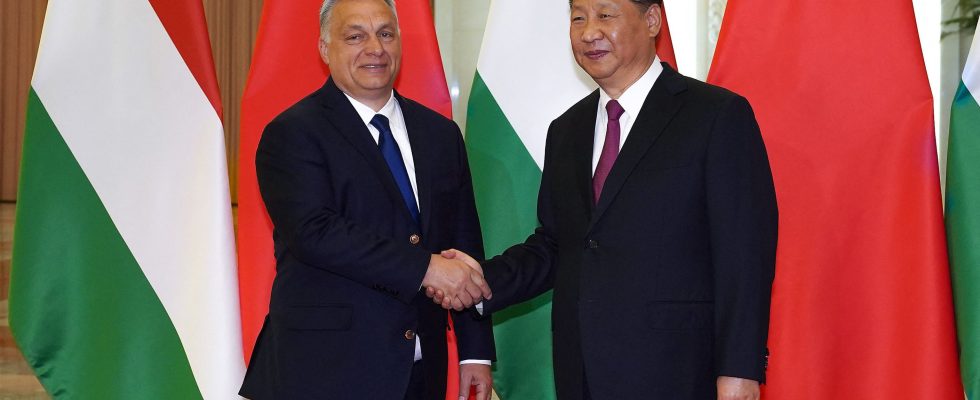The Chinese president had not traveled to Europe since 2019. Between the Covid-19 epidemic and the war in Ukraine, the Old Continent has changed a lot. It is in this context of diplomatic uncertainties that France is rolling out the red carpet for Xi Jinping. Objective: to ensure that the main ally of Russian President Vladimir Putin does not fall into clear support for his war effort against kyiv. After his visit to President Emmanuel Macron, the Chinese president will fly this Tuesday evening to Hungary and Serbia, two states considered to be the most favorable to Moscow.
China is using the east of the continent as a fulcrum for its growing economic ambitions in Europe. As Europe’s top leaders pursue increasingly protectionist policies to limit the influence of Beijing and Moscow on the continent, the governments of conservative nationalist leaders Viktor Orban of Hungary and Aleksandar Vucic of Serbia are courting economic ties with the Middle Kingdom.
With this route, Beijing also proves that it is alone in deciding its agenda and is making a gesture of sympathy towards countries like Hungary and Serbia. Their two leaders, Orban and Vucic, visited the Chinese capital during the “New Silk Roads” forum in October 2023 – the only Europeans, alongside Vladimir Putin. Since Xi came to power, they have never failed to show signs of respect, proximity, welcoming Chinese investments, and have never openly criticized the Asian giant.
25th anniversary of the NATO bombing of Belgrade
To begin with, Xi is expected to arrive in Belgrade on Tuesday evening and the choice of this destination is no coincidence. Indeed, Beijing has injected billions into this neighboring Balkan country, which is not in the European Union, particularly in the mining and manufacturing sectors. Concretely, China built roads and financed the establishment of a railway line between Belgrade and Budapest. Moreover, last year, Beijing and Belgrade signed a free trade agreement. It must be said that the Chinese are welcomed with open arms in Serbia: they do not need a visa and their brands flood the markets.
In addition to economic and diplomatic cooperation, the two allies agree on the military level. In 2022, through six large carrier aircraft of the Chinese Air Force, Beijing spectacularly delivered several surface-to-air missile batteries to Serbia to constitute a “small air wall” in the Balkan country.
Furthermore, Xi Jinping’s visit coincides with the 25th anniversary of the NATO bombing of the Serbian capital, which left three people dead. The latter had been attributed to a CIA mapping error. In 1999, the Atlantic Alliance carried out a bombing campaign against Serbian targets during the Kosovo War. Chinese President Xi Jinping has criticized NATO for its “flagrant” bombing of the Chinese embassy in Yugoslavia in 1999, warning that Beijing “would never allow such a tragic history to repeat itself.”
“Twenty-five years ago today, NATO blatantly bombed the Chinese embassy in Yugoslavia, killing three Chinese journalists,” Xi wrote in Politics. “We should never forget this. The Chinese people cherish peace, but we will never allow such a tragic history to repeat itself,” he said. He also praised the “ironclad friendship” between China and Serbia, which he said was “forged with the blood of our compatriots.”
Hungary, gateway to Europe
Then, the Chinese president will visit Hungary from May 8 to 10. Here too nothing is left to chance since Hungary was the first European country to sign, in 2015, a cooperation agreement with Beijing as part of the “Belt and Road Initiative”. While China sees Budapest as a gateway to Europe, it is also investing heavily in electric vehicle factories, such as the one in Szeged, in southern Hungary. This is part of its new relocation strategy in Europe to remain within the limits of the European Union, whose trade policy is increasingly strict.
Last February, China proposed deepening security cooperation with Hungary, highlighting warming ties between Budapest and Beijing, just as Hungarian officials were snubbing a Washington delegation visiting the country. At that time, Hungarian Prime Minister Viktor Orban met with Chinese Minister of Public Security Wang Xiaohong.
Result: a clause in a security agreement was signed between China and Hungary providing for the possibility of agents from the two countries patrolling together. However, this is not the first time that we have seen Sino-European patrols: Chinese police officers have been circulating in tourist areas in Croatia since 2018 and in Serbia since 2019. Also a way for Beijing to show that it knows how to make friends in Europe.
